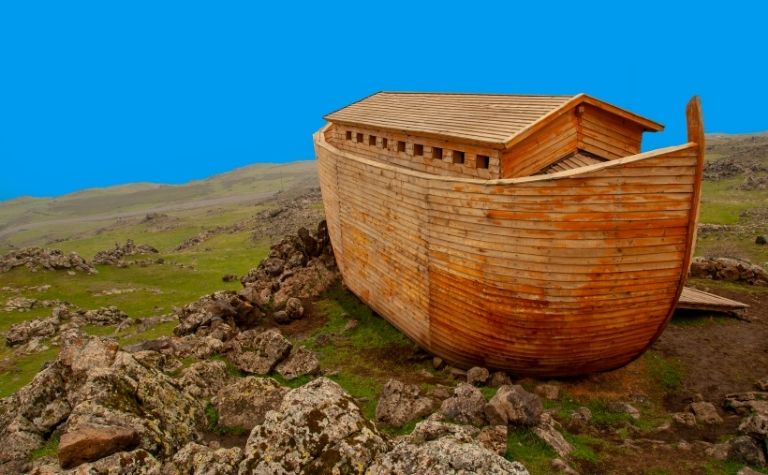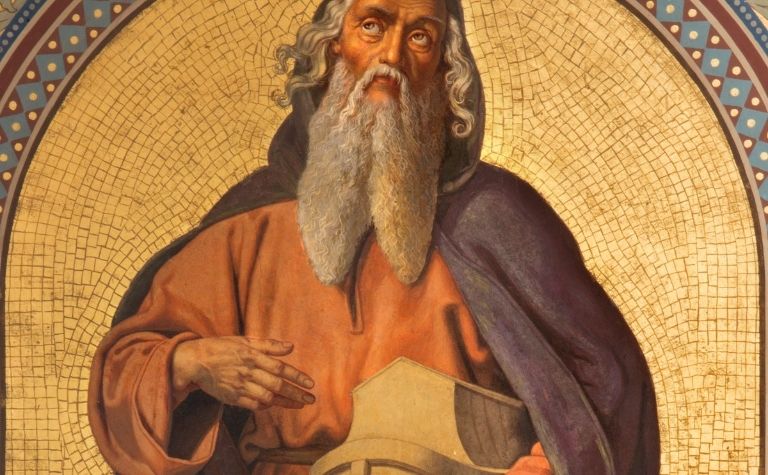The story of the global flood in the days of Noah is one of the most important in the Bible. The narrative reveals the nature of people, the nature of God, and the unparalleled worldwide catastrophe that occurs when the two intersect. In the story, Noah is set apart from the rest of humanity, as is evident in God giving special instructions to him. Many readers are curious to know why God chose Noah for the task.
Noah was a man who was uniquely righteous in an era of exceptional wickedness in the world. Genesis reports that every motive and thought people had in their hearts was only evil all the time. In contrast, Noah exhibited extraordinary faith as he walked with God in obedience.
What was the world like in Noah’s day? Why did Noah find favor in the eyes of the Lord? Was Noah a preacher? Was Noah a shipbuilder? Keep reading to learn the answers to these questions and others.
Also see What Does the Bible Say About Noah? to learn more.

What was the world like in Noah’s day?
After sin entered the world, it increased in frequency and intensity (Gen. 3:1-6:7). Like Adam and Eve rebelled against God, so did their children, and their children’s children after them.
People rebelled against God in their behavior because of the sin in their hearts. Genesis 6:5 says God “saw that the wickedness of man was great in the earth and that every intention of the thoughts of his heart was only evil continually” (ESV). Sin had thoroughly corrupted the hearts and minds of people.
Because God was grieved and regretted that he had made people (Gen. 6:6), he decided to destroy his creation with a worldwide flood. “I will blot out man whom I have created from the face of the land, man and animals and creeping things and birds of the heavens, for I am sorry that I have made them” (ESV).
However, Noah was the one exception to the world’s wickedness. He was a ray of light in a world of darkness. As a result, Noah “found favor in the eyes of the Lord” (Gen. 6:8).
Why did Noah find favor in the eyes of the Lord?
Genesis scholar Gordon Wenham writes, “To find favor is a formal expression often used when someone is making a request of a superior (e.g. 33:8, 10) or when someone in authority helps someone without status (39:4). It is sometimes used in prayer when men are asking favors of God (18:3; Exod. 33:12, 13, 16), but it is very rare for it to be said outright that a man has favor in God’s sight.” [1]
Genesis 6:9 reveals three important truths about Noah that explain why God choose him to build the ark. These descriptions of his character and relationship with God show him to be unique among his contemporaries.
Bible translations render the descriptions similarly, yet there are differences, as the table below reveals. The numbers are provided so readers can easily make comparisons between the translations.
| Translation | Description |
|---|---|
| ESV | (1) Noah was a righteous man, (2) blameless in his generation. (3) Noah walked with God. |
| KJV | (1) Noah was a just man and (2) perfect in his generations, and (3) Noah walked with God. |
| NASB | (1) Noah was a righteous man, (2) blameless in his time; (3) Noah walked with God. |
| NIV | (1) Noah was a righteous man, (2) blameless among the people of his time, and (3) he walked faithfully with God. |
| NLT | (1) Noah was a righteous man, (2) the only blameless person living on earth at the time, and (3) he walked in close fellowship with God. |
The threefold description of Noah in Genesis 6:9 reveals that the motives and thoughts of his heart were unlike anyone else in the world at the time.
- Noah was righteous/just: Noah adhered to God’s moral standards. He lived according to God’s definitions of right and wrong in the context of a covenant relationship with him. At the time, the rest of the world lived according to their own standards, which their sinful nature dictated.
- Noah was blameless/perfect: The literal meaning of the Hebrew word is perfect or flawless. However, the description doesn’t mean that Noah was without sin. Genesis also uses the term to describe Abraham (Gen. 17:1). Readers can observe an illustration of Noah’s sin after the flood (Gen. 9:18-27).
- Noah walked closely/faithfully with God: This phrase refers to the fellowship that Noah had with God. Noah lived in close proximity to God in the sense that he had faith in him, obeyed him, and interacted with him. Genesis also uses the term to describe Enoch (Gen. 5:24).
Later generations knew Noah as a man of high character and great faith. For example, in the New Testament, Hebrews 11:7 reads, “By faith Noah, being warned by God concerning events as yet unseen, in reverent fear constructed an ark for the saving of his household. By this he condemned the world and became an heir of the righteousness that comes by faith” (ESV).
Also see Why Did Noah Flood the Earth? to learn more.

Noah was a man of faith and obedience
Noah’s faith in God resulted in obedience. The flood narrative in Genesis (Ch. 6-9) records several statements about Noah’s obedience in different parts of the story.
- Genesis 6:22, “Noah did this; he did all that God commanded him.”
- Genesis 7:5, “And Noah did all that the Lord had commanded him.”
- Genesis 7:9, “two and two, male and female, went into the ark with Noah, as God had commanded Noah.”
- Genesis 7:16, “And those that entered, male and female of all flesh, went in as God had commanded him. And the Lord shut him in.”
Also see When Did Noah Live? to learn more.

Was Noah a preacher?
In the New Testament, Peter refers to Noah as a “preacher,” according to some translations (see below). The Greek word translated as “preacher” is kérux (κῆρυξ).
The word generally refers to a herald or messenger. In the New Testament, it describes an ambassador of God and the herald or proclaimer of the divine word (Thayer’s Greek Lexicon). Paul uses the same word to describe himself as a preacher twice (1 Tim. 2:7; 2 Tim. 1:11).
While Noah may not be the same kind of “preacher” as Paul was, Peter seems to indicate that he was vocal about God’s moral standards toward the wicked people of his generation.
| Translation | 2 Peter 2:5 |
|---|---|
| ESV | “if he did not spare the ancient world, but preserved Noah, a herald of righteousness, with seven others, when he brought a flood upon the world of the ungodly” |
| KJV | “And spared not the old world, but saved Noah the eighth person, a preacher of righteousness, bringing in the flood upon the world of the ungodly” |
| NASB | “and did not spare the ancient world, but preserved Noah, a preacher of righteousness, with seven others, when He brought a flood upon the world of the ungodly” |
| NIV | “if he did not spare the ancient world when he brought the flood on its ungodly people, but protected Noah, a preacher of righteousness, and seven others” |
| NLT | “And God did not spare the ancient world—except for Noah and the seven others in his family. Noah warned the world of God’s righteous judgment. So God protected Noah when he destroyed the world of ungodly people with a vast flood.” |
Was Noah a shipbuilder?
Genesis is clear that God chose Noah because of his faithfulness to him, not because of any skill he possessed. Nevertheless, some wonder if he was a shipbuilder.
Genesis scholar Victor Hamilton writes, “That Noah is commanded to build such a vessel suggests that he may be a shipright… Are Noah’s skills those of the navigational craftsman? His knowledge of ship building was likely minimal or non-existent; hence God had to give him such detailed information about building the vessel.” [2]
Also see How Many Wives Did Noah Have? to learn more.
References:
[1] Genesis 1-15 by Gordon Wenham. 145.
[2] The Book of Genesis: Chapters 1-17 by Victor Hamilton. p, 281.
Related Questions
For many Bible readers, the story of Noah's ark never gets old. They are in awe when they read about the magnitude of the floodwaters, thankful when imagining how God saved the animals, and hopeful...
The story of Noah, the flood, and the ark is one of the most iconic narratives in the Bible. Not only does the magnitude of the floodwaters leave readers awe-struck, but so does the faith that Noah...
